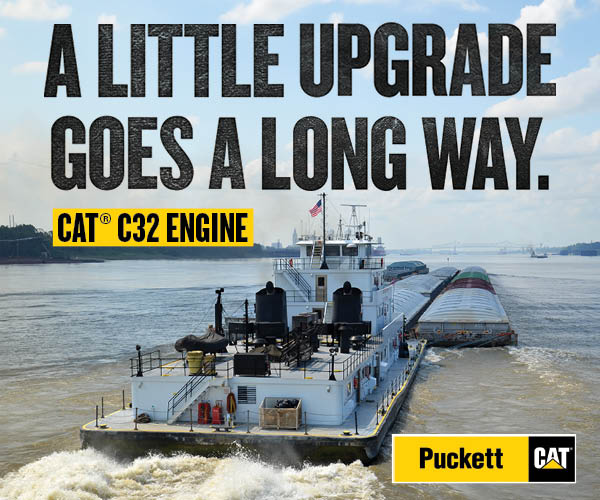Washington, D.C.—A key Senate committee unanimously advanced the Water Resources Development Act (WRDA) of 2024 that includes 81 feasibility studies and eight new or modified construction projects.
Passed by a vote of 19-0, S.4367 now heads to a vote on the Senate floor.
Other key provisions in the biennial legislation would increase the federal cost-share for inland waterways projects to 75 percent, require reports on invasive species, levee safety guidelines and public-private partnerships and direct the Government Accountability Office to conduct studies evaluating the U.S. Army Corps of Engineers practices and programs, including cost estimates for projects.
Sens. Tom Carper (D-Del.) and Shelly Moore Capito (R-W.Va.), chairman and ranking member of the Senate Environment and Public Works Committee, led the celebration for the bipartisan victory.
The House Transportation and Infrastructure Committee is eyeing a markup of its version of the bill in June.
“WRDA is still under development, but committee Republicans and Democrats, working together, are making good progress,” committee spokesman Justin Harclerode said.
Safety And Larger Vessels
The Coast Guard convened a Ports and Waterways Safety Board of Inquiry to evaluate the risks to critical port infrastructure posed by larger commercial vessels and increased traffic density.
“The safety of our ports and waterways is paramount, and this board will ensure that we have the necessary measures in place to address the challenges posed by increased maritime traffic and larger vessels,” said Rear Adm. Wayne Arguin, assistant commandant for prevention policy, who chaired the board.
Arguin described the board’s work as an “unprecedented assessment of our vital ports.”
Within 30 days, the board is tasked with identifying 10 domestic ports or port complexes to examine. It is to produce a final report by May 31, 2025.
In addition to conducting a comprehensive assessment of critical port infrastructure, the board specifically will examine the implications of larger, more complex vessels and evolving maritime traffic patterns on port infrastructure, including bridges, cargo terminals, pipelines, railways and power plants.
It also will recommend risk mitigation strategies and best practices to ensure navigational safety and conduct a review of the historical use and effectiveness of the Coast Guard’s existing waterways risk assessment tools.
According to the Coast Guard, a Ports and Waterways Safety Board of Inquiry is the highest-level assessment it conducts to address risks to port and waterway infrastructure following concerns from maritime incidents.
MTP Completion Certificates
The National Maritime Center (NMC) announced processing of merchant mariner credential applications could be hit by significant delays, citing completion certificates from maritime training providers (MTPs) that differ from the original sample submitted with approval requests.
“To identify fraud and prevent issuance of credentials to unqualified applicants, the NMC scrutinizes completion certificates closely,” the agency stated.
“Those not matching the original sample submitted with the approval request are investigated to determine legitimacy.”
Requests for changes to completion certificates should be submitted to NMCCourses@uscg.mil.
NMC also reported confusion among some MTPs regarding the process to obtain a course/program extension.
“Submission of a renewal request or receipt of a request for additional information from the NMC does not result in an automatic extension of the expiration date of a currently approved course/program,” the agency stated.
“MTPs need to specifically request an extension. The NMC will evaluate requests for extensions on a case-by-case basis.”
Requests also should be sent to NMCCourses@uscg.mil along with justification.
For additional information, contact the NMC Customer Service Center by using the online chat system, e-mailing IASKNMC@uscg.mil or calling 1-888-IASKNMC (427-5662).
National Maritime Day
In his 2024 proclamation naming May 22 as National Maritime Day, President Joe Biden praised merchant mariners for their unbreaking and unbending devotion to duty that includes delivering critical goods and troops to battlefields overseas and responding to devastating natural disasters around the world.
“Our merchant mariners have always met the moment, and my administration will always have their backs,” the president said.
Biden cited his enforcement of the Jones Act, ensuring that ships traveling between U.S. ports are American-built, American-owned and American-crewed, historic investments in the nation’s infrastructure, including rebuilding ports, and standards to prevent sexual assault and harassment and support survivors.
He also honored those mariners who made the ultimate sacrifice for the nation.
“We owe these fallen heroes a debt of gratitude we can never fully repay,” Biden said.
MRRIC Applications
The U.S. Army Corps of Engineers is soliciting applications to fill positions on the Missouri River Recovery Implementation Committee (MRRIC).
Applications and endorsement letters must be received by July 31 by mail to the U.S. Army Corps of Engineers, Omaha District (Attn: MRRIC), 1616 Capitol Ave., Omaha, NE 68102-4901 or e-mail to mrric@usace.army.mil with ‘‘MRRIC’’ in the subject line.
The MRRIC advises the Corps on a study of the Missouri River and its tributaries and provides guidance on Missouri River recovery and mitigation activities.
For additional information, contact Shelly McPherron at 402-803-0073.
Great Lakes Ballast Water Regs
The Federal Maritime Commission (FMC) is seeking comments on an investigation it launched into the impact of pending Canadian regulations governing ballast water management systems on U.S. carriers in the United States/Canada Great Lakes trade.
Comments should be submitted in English by June 21 via www.regulations.gov under Docket No. FMC-2024-0008.
In 2020, the Lake Carriers Association (LCA) filed a petition alleging the pending regulation would create conditions unfavorable to shipping by requiring U.S. vessels to install new ballast water management systems.
LCA argued that the requirement would impose a severe burden while offering negligible environmental benefits since relevant U.S. carriers take in but do not discharge ballast water in Canadian waters.
According to the FMC, significant potential consequences exist for Canadian-flagged vessels calling at U.S. ports if a violation of the Foreign Shipping Practices provisions is found such as limiting Canadian-flagged vessels from calling at U.S. ports and assessing significant fees on Canadian-flagged vessels.
For additional information, contact David Eng at 202-523-5725 or Secretary@fmc.gov.



